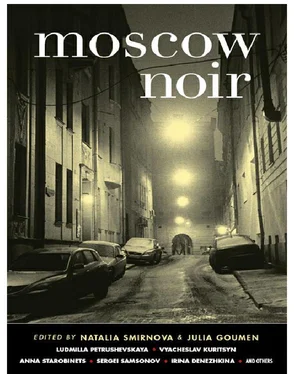“But you don’t see him much these days. Is that right?”
“No, we don’t hang out at all anymore. Almost two years now. When Pasha got out we cooked something up together, but we got busted pretty fast. Somehow, we never saw each other after that.”
“What do you mean, ‘got out’? Did he do time or something?”
“Well, yeah. For something incredibly stupid… A few joints, can you believe it? What bullshit—getting sent up for something like that is truly an art. There was a raid. And he hardly ever smoked. I shit you not, man, they dragged him in purely to meet their quota. For a few measly sticks of weed… but that’s how it works here, right? They can throw you in jail for anything they want. Article 228, section 1: acquisition and storage . The most they can give you is three years, I think—and that’s what they slapped on him. I don’t know why—the judge probably didn’t like his face or something. He did two of the three. Actually, it’s really not that long; but the pen did a number on him. He kind of jitters and jerks a bit when he moves now. See, Pasha always gets, you know, screwed over, somehow. Things never go his way. If you get mixed up with him, you’re gonna get caught red-handed, no matter what. Not because he’s low-down, or a cheat—on the contrary, he’s always honest; in fact, he’s way too honest. He’s a real German, you know—a pedant. Just has bad luck, that’s all. I got burned once because of him, and I started to avoid him after that.”
“What else happened to him?”
“What didn’t happen to him? I’m telling you. He never had a real, bona fide job; never had any money. He wrote for the papers—but he was never on any payroll. All his attempts at business failed. He wrote some kind of novel—same thing. Every publisher he contacted about it—eleven in all, I think—turned it down. Then, six years later or so, one publisher took it on. A minuscule print run; they paid him less than a thousand bucks. No one took any notice of it, naturally. Though Pasha himself said that’s par for the course here in Russia.”
“Why did you decide to get together again, if you don’t mind my asking?”
“He left behind some documents for that company we registered two years ago. And I wanted to see him again—see how the years have treated him. I just wanted to find out, you know, if his karma had taken a turn for the better.”
“So?”
“Well, same as ever. He’s gotten really weird… he’s drinking, I guess. Or shooting up. Not too good, anyway, from what I could see. But I tell you, I did enjoy seeing him. In the sense that, you know, nothing has changed. Because sometimes you think, you know, everything’s okay for me, things are working out, money’s piling up. You’ve got everything you need. And then suddenly something unexpected happens—just out of the blue. And, boom , you’re totally broke, your pockets are empty. Or the meter’s ticking. And so I took a look at Korenev, and, you know, I was convinced: if someone has bad luck, it’ll always be that way. And if your life has always worked out well, most likely it will continue that way…”
“Do you know a Gleb Mezentsev?”
“A little. Through Pasha.”
“Do you know what happened to him?”
“No…”
“He was in a car crash. Two months ago.”
“Whoa… what happened to him?”
“He’s in the hospital.”
“Hurt bad?”
“Pretty serious.”
“Hmmm… I guess that’s how it goes.”
“Pasha and Gleb were friends, weren’t they? I’d like to see Pasha, to talk to him. Could you give me his phone number—the one you reached him at? I’m looking for him, but everyone says he disappeared…”
“His number? Sure.”
I tossed my cigarette butt away, folded my arms behind my head, and stretched. A girl sitting directly across from me glanced over and then mechanically turned away. I just as mechanically slid my gaze above her head, a bit to the right: slid it along the concave façade of the Radisson, along the pseudoclassical colonnade of the station, along the bent stainless steel pipes in the center of the fountain, which were supposed to represent the horns of the bull who abducted Europa, according to the Belgian sculptor. A gift, you understand, to the city.
They’d probably be ashamed to erect something like that in the middle of Brussels.
A shaggy black dog gulped voraciously from the fountain. Little children waded in up to their knees. The girls sitting across from me finally stood up and walked by me, passing to my left toward the bridge, their heels clicking along. I thought to myself that if I had been here with Dmitry, like in the old days, an exciting little encounter with them would have taken place—at least a 70 to 80 percent chance of it.
I can’t say that I really envied his garrulous nature. His ability to get along with anyone, anywhere, at any time, and talk about whatever came up could be tiresome. But his very communicativeness bewitched me sometimes—in its universality and inexplicability. I couldn’t figure out what attraction Dmitry held for people of all ages, social backgrounds, and IQs. He didn’t have, say, Gleb’s brains. He wasn’t especially charming or handsome. He didn’t have the rudeness that is so attractive to girls. On the contrary, Dmitry’s manner and appearance were characterized by a faint, slightly intentional goofiness. A person without much education and wit, he played the role of an enfant terrible. And in this niche he enjoyed condescending but indubitable success, even when he behaved like a complete idiot. Everyone teased him, but at the same time they sought him out and called him incessantly (often without any reason whatsoever), and gathered around him in remarkably large, motley crowds. He affected people like a beautiful woman or free drinks: in his presence people began to chatter loudly, guffaw, and swagger. Guys gave themselves over as drinking buddies, girls as lovers. From the day he was born, Dmitry hadn’t had to lift a finger to find either business partners or bedfellows—in spite of the fact that the guy never stayed loyal to either.
I was no different from his other friends. I was glad to drink with him, prepared to lower my standards of intellect and wit, and was forgiving about minor and not so minor character flaws; I generally took on a protective role, even when our social and financial status suggested the exact opposite…
I thought about our spontaneous encounter last week. There was something very strange, and at the same time very predictable, in the repetition of the classic scenarios of the old days—two people with a bottle on the grassy slope across from Europe Square. Right above the station we saw a golden slash through the gray clouds. Dullish rays fell in fan-shaped sheaves on the shimmery heights of the construction site, its signal lights winking on the straining arms of the giant insectlike cranes. (When we used to sit here back then, there weren’t any cranes.) Below, from the Rostov embankment, a steady hum rose up, interspersed with bellowing horns and the gunning of engines. A Miller beer ad the size of a small building hung above the square, where everything ended for me…
We sat and drank, like before—both of us understanding perfectly well that it would never again be like it used to be. And then it dawned on me that Dmitry had started this phony demonstration of solidarity to prove to himself the absolute and fundamental inequality between us; two people who don’t differ in any fundamental way, neither superior to the other, yet one of them receives everything and everyone without asking, and the other is shunned and doesn’t even get what he has honestly earned. And neither one is to blame for this. And this is nobody’s fault. No one is to blame for anything—actually, there is never rhyme or reason to anything whatsoever.
Читать дальше












